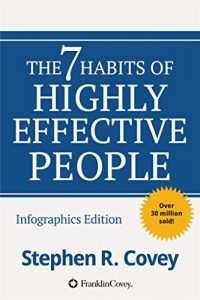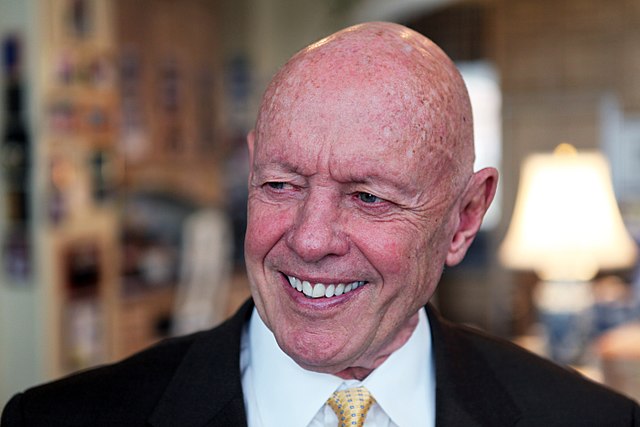MG writes: “I am looking for information on The Seven Habits program. My children go to a Catholic school that has incorporated the program into the counseling program. I have been trying to find out more about The Seven Habits program because of what I will call a “gut” feeling. I do not what to go to the school before I have more information to back up my uneasy feelings. Is the program ok and if not where can I look to get more information?”
MG, You have definitely done your school and community a great service by listening to the promptings of the Spirit and questioning whether Stephen Covey’s The Seven Habits of Highly Effective People should be used in your school. There are definitely some concerns that we’d like to share with you.
But first, it’s important to note that there are many things about Covey’s teachings that are correct, and that work for thousands of people; however, as the proverbial saying goes, “the devil is in the details” and administrators at the school would be wise to do some homework (no pun intended) in order to understand why Covey’s ideas might not be the best fit for Catholics.
First of all, Covey is a devout Mormon who has served the Church of Jesus Christ of Latter-Day Saints in various positions, including as a bishop and missionary. In a previous book entitled The Divine Center, written in 1982 for a Mormon audience, he speaks about centering one’s life in the god of Mormonism. Many of these concepts are included and built upon in The Seven Habits, which he wrote seven years later for a non-Mormon audience.
What’s interesting to note is that in The Divine Center, Covey advises Mormons not to hesitate “to work within the vocabularies of others to communicate our meanings …we can teach and testify of many gospel principles if we are careful in selecting words which carry our meaning but come from their experience and frame of mind” (DC p. 240).
In other words, use Christian language to communicate Mormon ideas.
 This is a problem because the\e “gospel principles” he talks about are not from our Bible. He claims they are principles that are part of every “major enduring religion” and that the more closely “our maps and paradigms are aligned with these principles or natural laws, the more accurate and functional they will be” (p. 35) but this isn't true.
This is a problem because the\e “gospel principles” he talks about are not from our Bible. He claims they are principles that are part of every “major enduring religion” and that the more closely “our maps and paradigms are aligned with these principles or natural laws, the more accurate and functional they will be” (p. 35) but this isn't true.
Covey openly states in The Divine Center that the only true and correct map is found in the LDS Church. It goes so far as to say that anyone who uses Covey’s material without embracing LDS teaching has an incorrect map “that distorts the knowledge of who we really are, who our Heavenly Father is, who Jesus Christ really is, and who the Holy Ghost really is…”
If Mormonism is the mind-set of Covey, and if he’s using our language to convey Mormon ideas in The Seven Habits, that’s a big problem for Catholics. This is especially true when you consider that Mormons embrace beliefs that are not even remotely Christian. For example, they believe the Trinity is an apostate doctrine, that humans are the offspring of the Heavenly Father and Mother, that God the Father has a physical body, that Jesus had a natural birth, and that God’s revelation can only be understood by reading the Bible along with the Book of Mormon and other Mormon works.
As concerning as this is, Covey’s involvement in Mormonism isn’t the only problem. He’s also heavily invested in New Age practices and refers to many of these modalities in The Seven Habits. While he mentions subliminal programming, neurolinguistic programming and “new forms of relaxation and self-talk processes” as “fundamentally sound,” the practice of New Age visualization is very prominent in The Seven Habits.
As this apologist wrote: “These meditation/self hypnosis techniques, according to Covey, involve getting the mind in a relaxed state through deep breathing and progressive muscle relaxation for the purpose of reprogramming or rescripting oneself (p. 133), are forms of programming (p. 135) and are powerful in that “if you visualize the wrong thing you will produce the wrong thing” (p. 134).
An article found in the EWTN library has this to say about The Seven Habits:
“The word ‘God’ only appears in the last page in his personal note, where he recognizes that no change can come to us without the intervention of God. However, throughout his book, ‘spiritual’ and ‘Church’ seems to be notions that are completely divorced from God. Spiritual renewal is more like Yoga exercises. ‘Church’ is a social activity which, at times, may be disruptive.
“Covey, the great communicator, does not seem to communicate much with his God. He never requests His help to bring about change in his habits and personality. The metanoia he prescribes is purely secular.”
Although this author believes the success of the Seven Habits should encourage the Catholic Church to come up with its own apostolate of the workplace and market place, “Covey's errors is precisely what the Church needs to correct in this apostolate.”
As this apologetics group wisely advises: “Some will say this book should simply be read for the good it contains and let's not throw the baby out with the bath water. Unfortunately this approach does not respond to the problematic conflicts the author and his books have with biblical doctrine. As a faithful adherent to Mormonism the author's beliefs and teachings are diametrically opposed to those of the Christian. He is a member of an organization that not only presents itself as Christian but, intentionally blurs or covers up the distinctions between it and true, Biblical Christianity. As his programs and writings grow in popularity, they make Mormonism and New Age beliefs more acceptable and appealing.”
As for whether or not this belongs in a Catholic school, James L. Heft puts it quite succinctly in this article: "...[W]e need to remember that it is possible to be very wrong and quite effective at the same time."
© All Rights Reserved, Living His Life Abundantly®/Women of Grace® http://www.womenofgrace.com

